
Other items in today’s column include
*A triple mitzvah
*The 4-1-1 on 2-1-1 and 9-1-1
*Recommended reading
*In memoriam

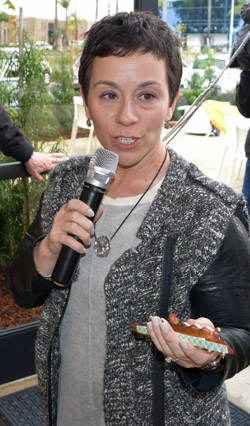
SAN DIEGO — Rabbi Yael Ridberg, spiritual leader of Congregation Dor Hadash, has added her name to two campaigns now building within the Jewish community. One, which has attracted leaders of more than 500 synagogues and Jewish organizations, voices solidarity with the Black Lives Matter movement. The other, launched by the National Council of Jewish Women, pledges support for education about women’s rights to autonomy over their own bodies.
Two other San Diego Jewish organizations –the Jewish Collaborative of San Diego, and Jewish Voice for Peace-San Diego — were among the nationwide assemblage of Jewish organizations and synagogues declaring, “We speak with one voice when we say, unequivocally: Black Lives Matter.
The statement also says, in part:
Black Lives Matter, the recent uprisings across the globe in the wake of the murders of Breonna Taylor, Ahmaud Arbery, George Floyd, Rayshard Brooks, and so many others, and the decades of political organizing across the country that have led to this moment are movements led by and for Black people.
We see through any attempt to suggest otherwise by pointing fingers, scapegoating, or using antisemitic dogwhistles.
As Jews, we know how dangerous this is: when politicians target Jewish people and blame us for problems, it leads directly to violence against us. When Black movements are undermined, it leads to more violence against Black people, including Black Jews.
Antisemitism is part of the same machinery those politicians use to blame Black and brown people, people who are immigrants, people who are Muslim, and more. But whether they generate division and fear based on our religion, our skin color, or how long we’ve been here, their goal is to keep us from working together to win the things we all need to survive and thrive.
When Jewish people join together with our neighbors across racial and religious differences, as we have in the past, we can protect each other and build the future of freedom and safety we all deserve.
Rabbi Ridberg, whose congregation is part of the Reconstructionist movement, also is among the initial group of rabbis endorsing NCJW’s “Rabbis for Repro” group, which plans to advocate and teach about reproductive rights.
In an announcement of the group’s formation, NCJW said:
The US Supreme Court just weighed in on a critical case impacting abortion rights and access nationwide, reaffirming our constitutional right to obtain this time-sensitive, essential health care.
However, this fight is far from over as anti-abortion lawmakers across the country continue their sustained and coordinated attacks on our reproductive freedom. Indeed, the Louisiana law that the US Supreme Court struck down represents just one of the nearly 450 state laws restricting access to reproductive health care — which range from outright abortion bans to biased counseling mandates to medically unnecessary regulations imposing onerous requirements on providers and patients — passed since 2011. And just before the Supreme Court ruling, Tennessee passed yet another iteration of the six-week ban that would prohibit abortion before many people even know that they are pregnant.
Now, more than ever, we need Jewish moral leadership to speak out for reproductive health, rights, and justice.
We must not remain idle while barriers to health care place any individual’s health, well-being, autonomy, or economic security at risk. And rabbis can help lead the fight for reproductive health, rights, and justice by educating their communities.
*
A triple mitzvah
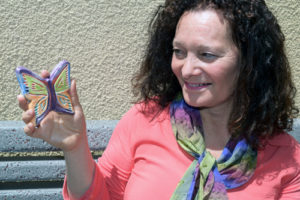
Cheryl Rattner-Price, co-founder and executive director of The Butterfly Project, has designated Sunday, July 26, as a day for people who want to help her organization continue to memorialize the 1.5 million children slain during the Holocaust to do what she calls a “triple mitzvah.” In the parking lot of the Jewish Communal Building at 4950 Murphy Canyon Road (home also of the Jewish Federation of San Diego County), volunteers will be ready to distribute six-piece butterfly ceramic kits for donors of $54 (the first mitzvah). Donors are requested to bring with them non-perishable food items for later distribution to needy families through Jewish Family Service’s Hand-Up Pantry (the second mitzvah). After the donors complete painting the ceramic butterflies, each of which represents one of the child victims of the Holocaust, representatives of The Butterfly Project will collect them so that they can be affixed to planter boxes that will be distributed to “front line” organizations helping the community. (The third mitzvah). More information about the triple mitzvah project may be obtained via this link.
*
The 4-1-1 on 2-1-1 and 9-1-1
Traditionally, 4-1-1 was the telephone company’s information line, which you could call if you wanted help looking up someone’s phone number. Today, you have to pay for that service, so it is not used as frequently as it once was. However, there are two very important, and free, three-number services that one may dial: 9-1-1 and 2-1-1. The former, 9-1-1, is to be called in times of life threatening emergencies. For example you’ve been in a terrible car accident or just witnessed one; you see a crime in progress; or perhaps someone is having a heart attack. In San Diego County, 2-1-1 is the number you call when you are in the need of social services. Perhaps you are on the verge of homelessness. Maybe you’ve been out of work, and you can’t afford food. Or maybe you have a persistent medical condition but can’t get health insurance. For these kinds of problems, you call 2-1-1, which has linked the resources of some 89 social service agencies and providers to get you the help that you need. And in times of natural disasters, like wildfires or earthquakes, 2-1-1 is the phone number you can call to get information, without burdening 9-1-1, which may be attending to people who need immediate rescue.
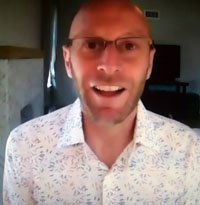
Ollie Benn, director of philanthropy for the Jewish Community Foundation, introduced call-in donors on Tuesday to a virtual tour of the 2-1-1 services headquarters, during which Bill York, the 2-1-1 chief executive officer; Jessica Peter, senior director of philanthropy, and Camey Christensen, senior vice president, each told a little bit of the 2-1-1 story. They explained that because clients often need to be referred to more than one social service agency (a homeless person may also have health problems, for example), the cooperating agencies agreed on a single set of forms that could be electronically transmitted to each other, saving clients the time and annoyance of having to answer the same questions again and again while trying to get help.
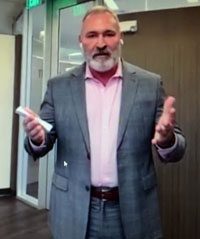
York said that while the social service agencies are able to share the forms, the sharing occurs under strict guidelines, protocols, and encryption so that a client’s confidentiality is not compromised. Information from the forms is aggregated to help spot trends. For example, Christensen commented, 88 percent of the clients experiencing housing instability had received “shut off notices” from utility companies. Aggregating data indicated that such shut-off notices very often are harbingers of homelessness.
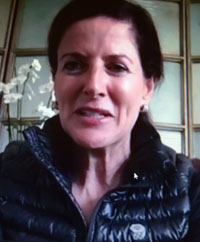
2-1-1 is a large agency, utilizing a staff of over 200 people to answer 2,500 calls per day, according to Peter. Christensen said the service has nearly 300,000 records of individuals, of whom 156,000 have given permission for their data to be transmitted electronically, as needed, from one agency to another, through what 2-1-1 calls its “Community Information Exchange (CIE)” program.
During the tour, Emily Einhorn announced that she and her husband, Dan, will engage in a matching fund, contributing $1 for every $3 raised among other sources, so that if $150,000 is raised, their contribution will bring the amount up to $200,000. The Einhorns are well known philanthropists within the San Diego Jewish community.
*
Recommended reading and viewing
*The Secure Community Network has issued a “white paper” for Jewish organizations to help them determine when and how they should reopen their facilities in the wake of the coronavirus pandemic and its possible resurgence. The white paper may be accessed by clicking here.
*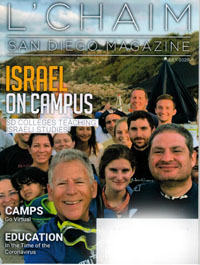 The July issue of L’Chaim San Diego Magazine has as its cover article a lengthy piece by Susan Lapidus, director of the Murray Galinson San Diego-Israel Initiative (MGSDII), describing that organization’s successful efforts to bring Israeli studies in a variety of disciplines to UC San Diego, San Diego State University, Cal State San Marcos, University of San Diego, and California Western School of Law. While many students think of Israel in the context of the Palestinian-Israeli conflict, MGSDII demonstrates what a multicultural, diverse and vibrant society Israel is by bringing professors to San Diego with expertise in such fields as television and movies, water reclamation, urban sociology, marine archaeology, climate change, aerospace engineering, and gerontology.
The July issue of L’Chaim San Diego Magazine has as its cover article a lengthy piece by Susan Lapidus, director of the Murray Galinson San Diego-Israel Initiative (MGSDII), describing that organization’s successful efforts to bring Israeli studies in a variety of disciplines to UC San Diego, San Diego State University, Cal State San Marcos, University of San Diego, and California Western School of Law. While many students think of Israel in the context of the Palestinian-Israeli conflict, MGSDII demonstrates what a multicultural, diverse and vibrant society Israel is by bringing professors to San Diego with expertise in such fields as television and movies, water reclamation, urban sociology, marine archaeology, climate change, aerospace engineering, and gerontology.
*I recently finished streaming two seasons of Shtisel, a multi-generational saga of a Satmar family living in Jerusalem, following the ritual requirements of their sect while coping with the ever-intruding modern world. For example, Rabbi Shtisel, a cheder teacher who becomes the principal, finds himself attracted to comedy albums; one of his sons, Aryeh, would like nothing more than to be a singer in a Hassidic rock n’ roll band, but that would take him away from his Torah studies. Another son, Akiva, who is the central protagonist, wishes to be an artist, but painting is considered a form of foolishness by those who believe only Torah study is worthwhile. Layered on top of these conflicts are those that occur when parents substitute their will for those of their adult children, and, in counterpoint, the folly that can develop when adult children follow their passions instead of parental advice. If you are like me, while watching this Netflix series, you will find yourself becoming emotionally involved in the story. I wanted to yell at some of the characters, and cry with others. I joked with my niece, Heather Z. Rothstain, who recommended the series to me that I don’t know now whether to condemn or commend her suggestion. The series certainly got my attention, teaching me along the way about some of the nuances of this segment of Israeli society.
*
In memoriam
Funeral services for Julia Dina Schulmann, daughter of Joseph & Joanne Schulmann and Lily Schulmann, will be conducted at 2 p.m., Wednesday, July 1, at El Camino Memoiral Cemetery, 5600 Carroll Canyon Road, San Diego, Rabbi Moshe Leider of Chabad of University City reported.
*
Donald H. Harrison is editor of San Diego Jewish World. He may be contacted via donald.harrison@sdjewishworld.com, Free obituaries in memory of members of the San Diego County Jewish community are sponsored on San Diego Jewish World by Inland Industries Group LP in memory of long-time San Diego Jewish community leader Marie (Mrs. Gabriel) Berg.